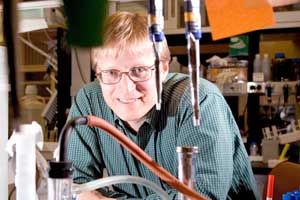Carl Correll, Assistant Professor in Biochemistry and Molecular Biology
By Catherine GianaroMedical Center Public Affairs
 | |
Most graduate students in the Biological Sciences Division, along with a few undergraduates and a few more Chemistry graduate students, know how Carl Correll performs in a classroom. That is because they all had to take his Protein Fundamentals class, which is offered every Fall Quarter. And it seems Correll, Assistant Professor in Biochemistry & Molecular Biology, fares pretty well because he has received a 2004 Faculty Award for Excellence in Graduate Teaching.
“The one thing that I love about teaching,” Correll said, “is the transition of a passive student to a more active one. When I first go into the classroom, all I see are glazed looks on their faces. As the course progresses they get used to answering my questions, and at the end of lectures I get much more feedback. Students ask questions and are more engaged.”
Correll also teaches the Nucleic Acids Structure and Function course with Phoebe Rice, Assistant Professor in Biochemistry & Molecular Biology. He begins the Fall Quarter by discussing RNA-protein interaction. He then turns the lectern over to Rice, and he relieves Joseph Piccirilli, Associate Professor in Biochemistry & Molecular Biology and Chemistry, by teaching the second half of the protein fundamentals course. (This past fall, however, Wouter Hoff, Assistant Professor in Biochemistry & Molecular Biology, filled in during Piccirilli’s sabbatical.)
No matter the course, Correll incorporates the Socratic method into his classes.
“When I first begin the lectures, there’s a lot of hesitation, and students are in the mode of sit back, relax and take notes,” he said. “It takes about three or four lectures before they are no longer in ‘couch potato mode.’”
Since he teaches graduate-level courses, Correll uses mainly primary literature.
“The fundamentals class is a transition from undergrad to grad work. As an undergrad, you’re asking them to understand concepts. Now we’re trying to get them not only to understand concepts but also to appreciate how they arose from the primary data, to design experiments and to test hypotheses—to start training them to think like scientists,” he said. “They’re going to be in a lab in a year, and they need to be prepared.
“I want them to be savvy consumers of science. I want them to question everything,” he continued. “They should always ask whether the data supports the conclusions that are drawn. Ultimately, I’m trying to get them to be critical thinkers, not passive intellectuals.”
Correll contended he would like to teach more classes, but there are just not enough hours in the day. “If you created a 30-hour day, I’d say yes.”
Although he enjoys teaching, Correll spends much of his time devoted to his research. He studies the interaction of RNA with protein, specifically ribosome, which is an “RNA-protein machine” that translates the information from RNA to make proteins. He concentrates on understanding how toxins, specifically sarcin and ricin, recognize and eventually inactivate ribosomes, leading to cell death.
He also studies the process of how ribosomes are made because it is a fundamental metabolic process, consuming a large percentage of cellular resources during cell proliferation.
After earning a doctorate in 1992 from the University of Michigan, Correll worked as a postdoctoral researcher at Yale University. He then joined the Chicago faculty in 1998.
![[Chronicle]](/images/sidebar_header_oct06.gif)